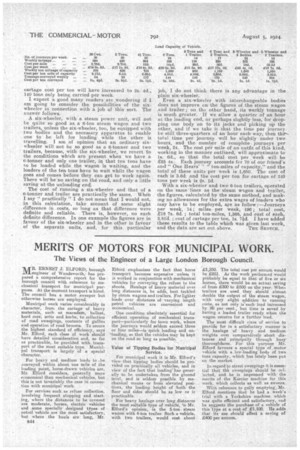MERITS OF MOTORS FOR MUNICIPAL WORK.
Page 26

If you've noticed an error in this article please click here to report it so we can fix it.
The Views of the Engineer of a Large London Borough Council.
MR. ERNEST J. ELFORD, borough engineer of Wandsworth, has prepared a comprehensive report for the borough council with reference to mechanical transport for municipal purposes. At the moment transport is hired. The council has a motor sweeper but otherwise horses are employed.
Municipal work varies considerably in character, from the cartage of heavy materials, such as macadam, ballast, hard core, setts and kerbs, to collection of road sweepings, contents of gullies and operation of road brooms. To secure the highest standard of efficiency, says Mr. Elford, each class of work should have detailed consideration and, so far as practicable, be provided with transport of the most suitable type. Municipal transport is largely of a special character.
For heavy and medium loads to -be conveyed within about one mile of the loading point, horse-drawn vehicles are, Mr. Elford considers, generally more economical than mechanical vehicles, but this is not invariably the case in connec.tion with municipal work.
For services such as refuse collection, involving frequent stopping and starting, where the distances to be covered are moderate, horses, electric vehicles and some specially designed types of petrol vehicle are the most satisfactory, but where . the hauls are long, Mr.
B44
Elford emphasizes the fact that horse transport becomes expensive unless it is worked in conjunction with mechanical vehicles for conveying the refuse to the shoots. Haulage of heavy material over long distances is, he adds, best tackled by steam wagons and trailers. For lighter loads over distances of varying length petrol vehicies are convenient and economical,
One condition absolutely essential for efficient operation of mechanical transport—particularly for town work, where the journeys would seldom exceed three or four miles—is quick loading and unloading, so that the vehicles may be kept on the road so long as possible.
Value of Tipping Bodies for Municipal Service.
For municipal work it is Mr. Elford's view that tipping bodies should be provided on practically all vehicles, and in view of the fact that loading' has generally to be undertaken from the ground level, and is seldom possible by mechanical means or from elevated positions, the loading height of both the floor and sides should be as low es is practicable.
For heavy haulage over long distances the most suitable type of vehicle, ;n Mr. Elford'.s opinion, is the 5-ton steam wagon with 4-ton trailer. Such a vehicle, with two trailers, would cost about
,E1,250. The total cost per annum, would be £851. At the work performed Would probably be equal to that of five or six horses, there would be an actual saving of from £300 to £500 on the year. When trailers are used they should almost double the output of the steam wagon, with very slight addition to running costs, as not only is each load increased by 80 per cent., but time is saved by having a loaded trailer ready when the wagon returns for a further load.
The most difficult class of service to provide for in a satisfactory manner is the havlage of heavy and medium weights over comparatively, short distances and principally through busy thoroughfares. For this purpose Mr. Elford favours a special type of motor vehicle with a low-loading body of two tons capacity, which has lately been put on the market.
In regard to street sweepings it is essential that th6 sweepings should be collected, and he is impressed with, the merits of the Karrier machine for this work, which collects as well as sweeps.
With reference to gully emptying, Mr. Elford mentions that he had a week's trial with a Yorkshire machine which was quite efficient and satisfactory, and he suggests the purchase of a vehicle of this•type at a cost of £1,100. He .adds that its use should effect a saving of £400 per annum.






























